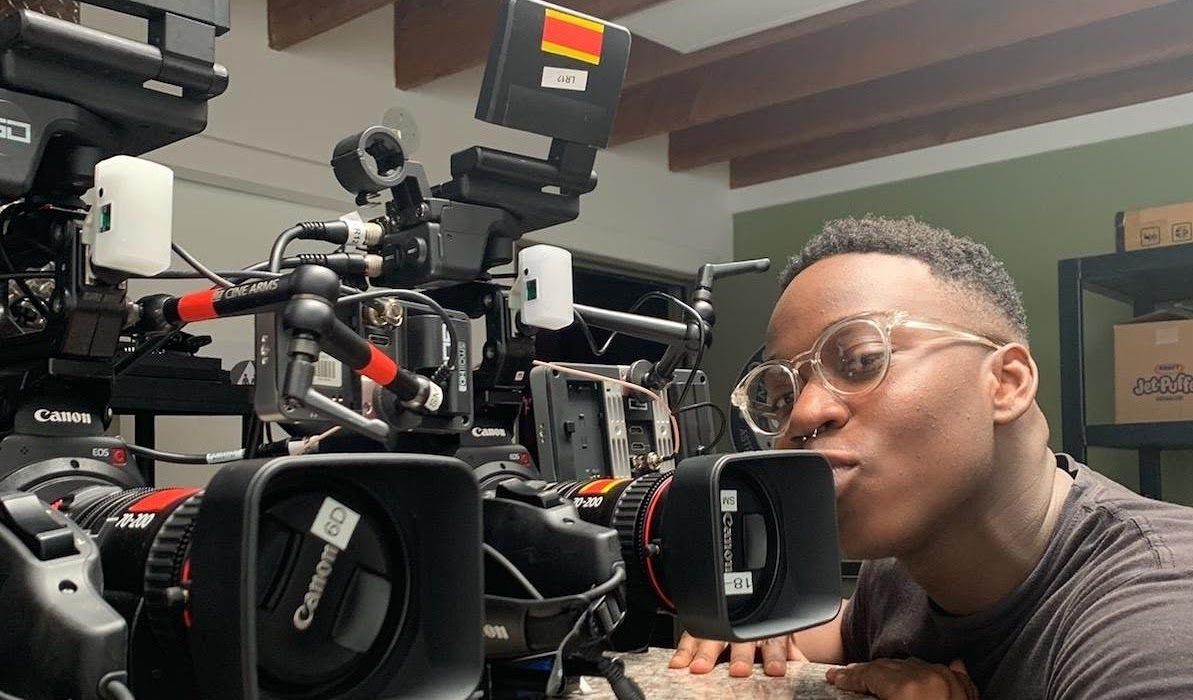
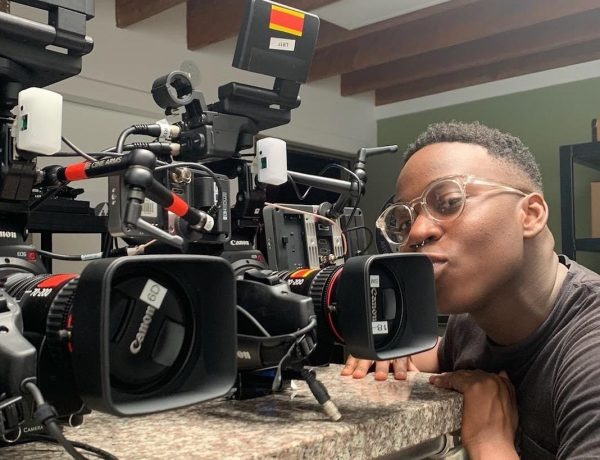
Boone Achievement Award Winner Still Going Strong
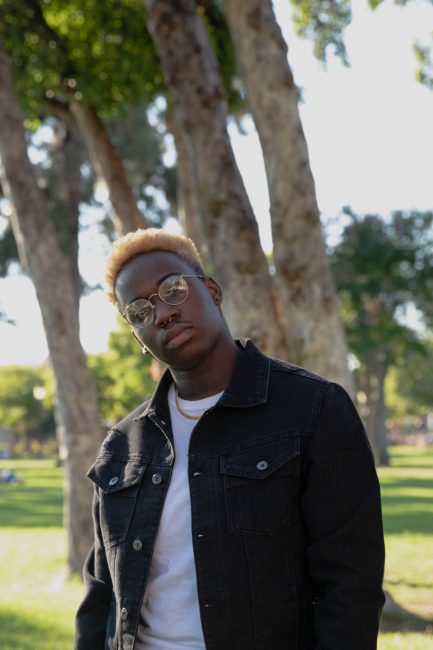 In 2017, the Boone Achievement Award Program was established to help remove barriers for deserving students in Career & Technical Education programs at PCC. The program provides CTE graduates with the tools and equipment necessary in their field—everything from automotive tools to cosmetology kits.
In 2017, the Boone Achievement Award Program was established to help remove barriers for deserving students in Career & Technical Education programs at PCC. The program provides CTE graduates with the tools and equipment necessary in their field—everything from automotive tools to cosmetology kits.
Video production major Xavier Dubose was awarded a brand new Canon EOS 80D Digital SLR camera and Gimbal stabilizer in 2020. Now, the PCC Foundation catches up with Xavier to learn about all the amazing things he’s been up to since graduating last Spring.
Receiving the Boone Achievement Award was a total surprise for me. I didn’t even know about the Awards before that, and so when they called my name during the ceremony, I was over the moon.
How did the Foundation get you to the ceremony if you didn’t know about the Achievement Awards?
I was working on a video project for some of the other recipients. They needed help formatting the video or something. I don’t remember the details of what they said, but that’s why I was there. It was pretty clever, because I definitely didn’t suspect anything.
And your degree was in video production, correct?
I was actually getting a couple different degrees at the time: video production as well as communications. But the one that I got the award for was my degree in video production, yes. It’s a two-year program that prepares students to go straight into the workforce. The only problem is that once you graduate and get into the workforce, you sometimes don’t have the money to get the things you need in order to do the work. Especially in my field, no one’s going to supply me with a camera and a computer and editing software. I have to do that myself. So this award extends way outside of PCC, which is so great.
 What was your award?
What was your award?
So for the Boone Achievement Awards, each recipient is gifted around $2,500 which goes toward something they need in their respective field. For me, that money went toward the Canon, along with something called a Gimbal Camera Stabilizer, which is a device that allows you to move around with your camera and capture smooth, stabilized footage. It’s very essential in my field, and I use it all the time. Other award winners received different gifts. There were mechanics and welders and nursing students there, so the nature of the award differed from person to person.
Have you always been interested in film?
Oh, absolutely! I grew up watching all the behind-the-scenes reels on DVDs and just being fascinated by the whole process. I got started in community theater. I used to make props and help build sets. I liked the technical side of showbiz, you could say. But I was also really into robotics and space exploration. For a while, my family expected me to become an engineer and work on the Mars rover or something. My mom ended up taking me to the Kennedy Space Center for my birthday one year—this is where it all started, you see—and she got this new digital camera to take pictures with. But she didn’t really know how to work it; she didn’t want the hassle, so she handed it to me to figure out. I tinkered with that thing the whole trip and fell in love with cameras. And that’s essentially how my interest in film came about: I merged my love for the technical with performance art.
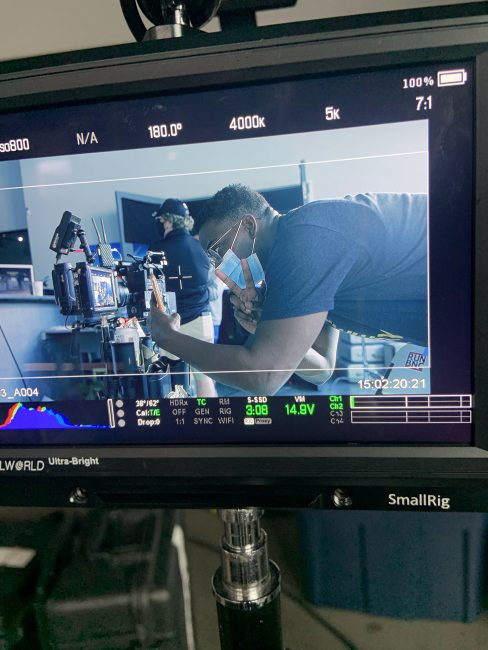 What made you choose PCC over other film schools?
What made you choose PCC over other film schools?
Affordability. That was a really big thing for me. And location, too. I’m from Virginia. I love the East Coast, but the West Coast is where the film and television industry is, so I knew I needed to be in the area. But also, I was on PCC’s campus the year before I enrolled, just to check it out and make sure I really wanted to go there. I remember sitting in on a film basics class to get a sense of what the program was like, and I loved it. There was something about the class, about the students there. Yeah, I was sold.
From what I remember, my first couple of semesters at PCC were a little rough. I was trying to find my footing and figure out what I was working toward. I was also being a little impatient with my general education classes. I kept thinking, I know I want to work in the film and television industry, so why am I spending so much time on all these math and English assignments? But by 2018, things got really great for me. I became involved with the Students in Media and Broadcasting Association. That took me on a very fun and worthwhile journey while I was at PCC. It allowed students in the program to get actual paying clients, allowed them to work on real projects and get that hands-on professional experience that sometimes provides even more of an education than a class does. I got experience working as a showrunner, as an executive producer. Yeah, it was an invaluable experience for me. Those were some truly amazing years.
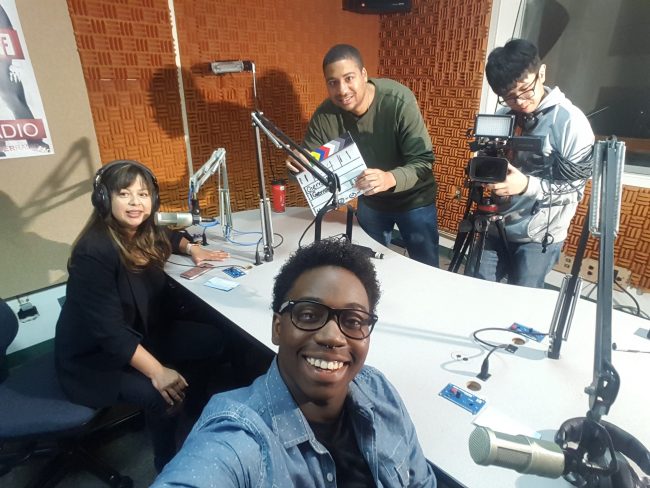 What was it like being a communications and video production student in 2020?
What was it like being a communications and video production student in 2020?
Yeah, so here comes COVID, right as I’m getting ready to graduate. Honestly, it was a lot to jump straight into remote learning. I had previously taken online classes in high school, and so I already knew remote learning was not for me. In fact, one of the reasons I picked PCC was because I wanted my education to be a certain way, to have a certain feel. I loved PCC’s campus; I loved the programs it offered. When I first enrolled in 2017, I didn’t listen to my advisors who were telling me to take all these general education classes, and so I’d already done all my production classes, all the things that you benefit from by being on campus. So while it was hard not being able to be on campus and see everyone in 2020, I was still able to work towards my degree without feeling like I was missing out on that important in-person learning.
Were you at least able to return to campus once restrictions were lifted?
Actually, no. I had to finish my degree online, which was bittersweet. I was definitely part of that group of students who felt a little bummed out that we weren’t really getting a proper graduation experience. I still do some work at PCC. Before and during the pandemic, I was working as a student worker for the Lancer Pantry, helping with their marketing. I go back a couple days a week to help out. It’s definitely interesting being back on campus, but not as a student.
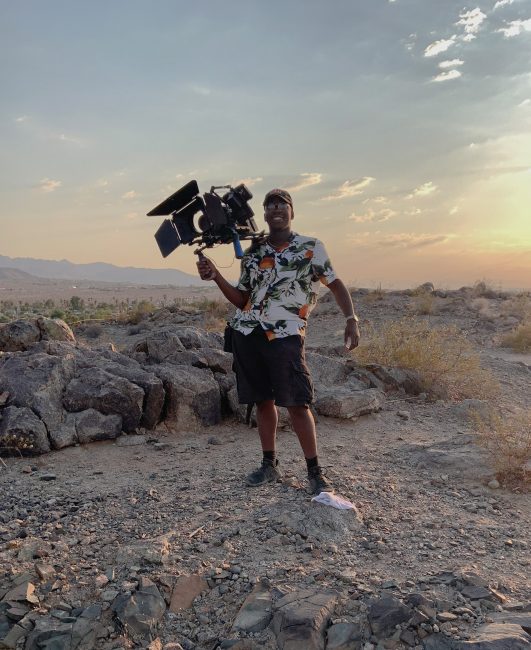 What are you up to these days?
What are you up to these days?
Well, I have my own production company: Wolf Bait Studios. I work with a lot of different companies, either as a director or producer, sometimes both. I recently produced and directed these tutorial videos for a new board game. It’s kind of like Dungeons and Dragons meets an old-fashioned murder mystery. It’s a lot of fun.
I also shot a feature film in January. I lit an episode of Soul of a Nation on ABC; I lit another feature, a Hallmark rom-com. And just last week, I worked on a show with Canon featuring one of their newest lenses and the tutorial that’s going to be put out for it.
Where is Xavier DuBose in 10 years?
Let’s see…in 10 years, I have a feature film out on a bunch of streaming services. Maybe even multiple films. I’m continuing to uplift other people of color in the industry and make sure they have access to the same opportunities that a lot of other people have had access to over the years. That’s one of the things I always loved about PCC, in fact. Its professors really cared about getting their students to the next step in their careers. It wasn’t just about teaching them how to operate a camera—though that’s obviously a big part of it. But it was also about guiding them from the classroom into the real world, where they would be working as a camera assistant or a PA, where they would be getting that hands-on experience. I mean, it can be hard as a community college student to find those kinds of opportunities. I still have my education, and it’s a great one!
You’re very passionate about this.
Oh, absolutely. It’s one of the reasons I’ve stayed local and active at PCC. It has good people there who know the industry and who are eager to help students and alumni find work. I mean, I worked on a union feature film the same month I graduated. PCC helped facilitate that. As an example, I met a cinematographer who saw the work I was putting in while I was at PCC and he kept giving me opportunities to work with him.
So yeah, in 10 years, I’d like to be doing what I’m doing now, but better.